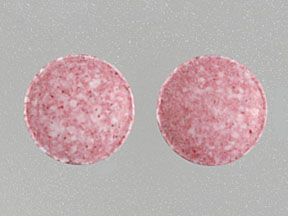
B-12 Coupons & Savings Card – Discount Prices from $5.15
**Vitamin B12 (Cyanocobalamin) Overview:**
Vitamin B12, also known as cyanocobalamin, is a supplement used to address vitamin B12 deficiency in adults. This essential nutrient is crucial for the body, aiding in the formation of red blood cells, supporting nerve cell health, and contributing to DNA synthesis.
**Usage and Dosage:**
The supplement is commonly available in pill or liquid form and is usually consumed orally once a day. However, the dosage may vary based on individual health needs, so it's important to follow your healthcare provider's instructions.
**Benefits and Considerations:**
Vitamin B12 is generally well tolerated with minimal side effects. It is important to consult with a healthcare professional before starting any new supplement to ensure it is safe and appropriate for your specific health circumstances. Always rely on professional medical advice tailored to your personal health conditions.
Our coupons are free to use. Before paying, show the pharmacist your B-12 savings card to get your free discount. Use our filters below to edit the prescription box to match your needs. The B-12 prices will update based on your prescription needs. Above our B-12 coupons, you can change your location to see pharmacy prices and costs in other areas. We're here to help you buy B-12 at the lowest price with our prescription discount card.
My prescription
Edit
1000MCG, B-12 (90 Tablet Sublinguals)
Select pharmacy

Walgreens
$5.15
COUPON PRICE
Albertsons
$8.16
COUPON PRICEB-12 savings card
Show this card to your pharmacist
Walgreens
$5.15
BIN
ID
PCN
GRP
019876
LHF71E5580
CHIPPO
LHX
Powered by
**Vitamin B12 (Cyanocobalamin) Overview:**
Vitamin B12, also known as cyanocobalamin, is a supplement used to address vitamin B12 deficiency in adults. This essential nutrient is crucial for the body, aiding in the formation of red blood cells, supporting nerve cell health, and contributing to DNA synthesis.
**Usage and Dosage:**
The supplement is commonly available in pill or liquid form and is usually consumed orally once a day. However, the dosage may vary based on individual health needs, so it's important to follow your healthcare provider's instructions.
**Benefits and Considerations:**
Vitamin B12 is generally well tolerated with minimal side effects. It is important to consult with a healthcare professional before starting any new supplement to ensure it is safe and appropriate for your specific health circumstances. Always rely on professional medical advice tailored to your personal health conditions.
Our coupons are free to use. Before paying, show the pharmacist your B-12 savings card to get your free discount. Use our filters below to edit the prescription box to match your needs. The B-12 prices will update based on your prescription needs. Above our B-12 coupons, you can change your location to see pharmacy prices and costs in other areas. We're here to help you buy B-12 at the lowest price with our prescription discount card.
More prescriptions for vitamin b12 deficiency
coupons from$4.97Save 58%
coupons from$4.97Save 75%
coupons from$251.54Save 67%
coupons from$349.28Save 59%
coupons from$4.97Save 75%
More prescriptions for vitamin b12 deficiency
Vitamin B-12 Save 58%coupons from $4.97
Dodex Save 75%coupons from $4.97
Nascobal Save 67%coupons from $251.54
Hydroxocobalamin Save 59%coupons from $349.28
Cyanocobalamin Save 75%coupons from $4.97
B-12 dosage forms
Use our B-12 100-5000MCG coupon with prices from $6.70 for 30 Tablet Sublinguals. You can also use our B-12 100-5000MCG coupon with prices from $8.26 for 40 Tablet Sublinguals. We have a B-12 100-5000MCG coupon with prices from $9.45 for 60 Tablet Sublinguals. You can use our B-12 500MCG coupon with prices from $9.04 for 90 Tablet Sublinguals.
Dosage Quantity Price from Per unit 100-5000MCG 30 Tablet Sublinguals $6.70 $0.22 100-5000MCG 40 Tablet Sublinguals $8.26 $0.21 100-5000MCG 60 Tablet Sublinguals $9.45 $0.16 500MCG 90 Tablet Sublinguals $9.04 $0.10 500MCG 100 Tablet Sublinguals $9.21 $0.09 1000MCG 90 Tablet Sublinguals $5.15 $0.06 1000MCG 100 Tablet Sublinguals $5.50 $0.06 1000-400MCG 60 Tablet Sublinguals $9.51 $0.16 2500MCG 60 Tablet Sublinguals $9.44 $0.16 2500MCG 75 Tablet Sublinguals $9.93 $0.13
| Dosage | Quantity | Price from | Per unit |
|---|---|---|---|
| 100-5000MCG | 30 Tablet Sublinguals | $6.70 | $0.22 |
| 100-5000MCG | 40 Tablet Sublinguals | $8.26 | $0.21 |
| 100-5000MCG | 60 Tablet Sublinguals | $9.45 | $0.16 |
| 500MCG | 90 Tablet Sublinguals | $9.04 | $0.10 |
| 500MCG | 100 Tablet Sublinguals | $9.21 | $0.09 |
| 1000MCG | 90 Tablet Sublinguals | $5.15 | $0.06 |
| 1000MCG | 100 Tablet Sublinguals | $5.50 | $0.06 |
| 1000-400MCG | 60 Tablet Sublinguals | $9.51 | $0.16 |
| 2500MCG | 60 Tablet Sublinguals | $9.44 | $0.16 |
| 2500MCG | 75 Tablet Sublinguals | $9.93 | $0.13 |
| 2500MCG | 90 Tablet Sublinguals | $10.41 | $0.12 |
| 2500MCG | 110 Tablet Sublinguals | $11.06 | $0.10 |
| 3000MCG | 60 Tablet Sublinguals | $9.30 | $0.15 |
| 5000MCG | 30 Tablet Sublinguals | $8.68 | $0.29 |
| 5000MCG | 60 Tablet Sublinguals | $9.87 | $0.16 |
| 5000MCG | 90 Tablet Sublinguals | $11.05 | $0.12 |
